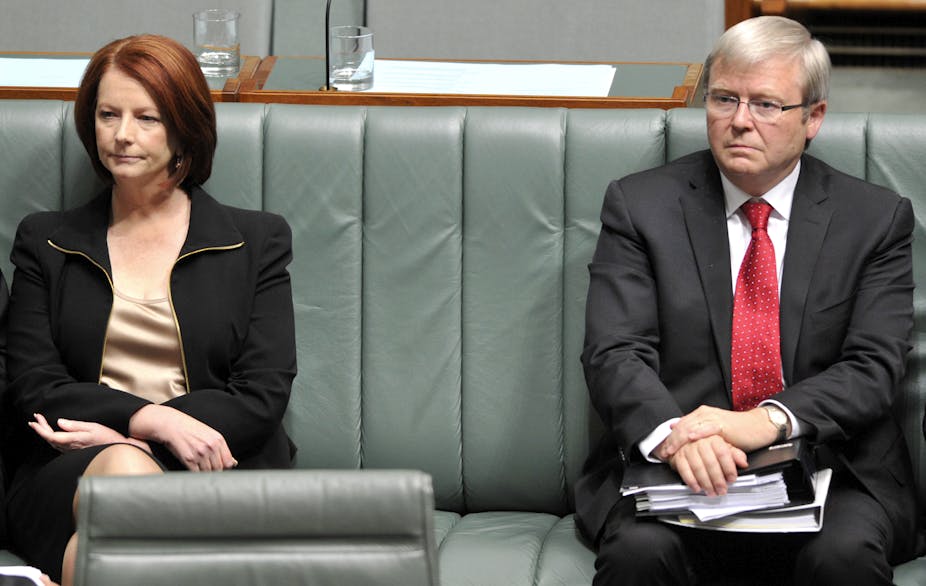Kevin Rudd’s presence as Foreign Minister has been a constant reminder that Julia Gillard’s ascension to Prime Minister was never fully accepted in the electorate, a perception confirmed by the 2010 election resulting in a hung Parliament.
The latest ACNielsen poll has shown Rudd would win an election held now (52%-48%) if he was returned as Labor leader.
While this transition is unlikely in the near future, if the ALP’s primary vote continues to poll below 30%, it is increasingly unlikely Gillard will lead Labor to the next federal election.
Snap election?
Choosing Rudd again over Gillard would be a huge gamble, but facing a loss at the level recently suffered in New South Wales could drive a desperate caucus to such drastic action.
Labor would lose 35 seats – around half its current numbers – if current polling is replicated in an election.
The Coalition is reportedly preparing for a snap election already, if Rudd becomes leader, but such speculation is likely premature.
Biding his time
It could suit Rudd’s purposes to wait until after the carbon tax comes into effect in mid-2012, before considering a leadership challenge.
The fate of Gillard largely relies on successfully passing and implementing the carbon tax legislation now being introduced in parliament.
And she must also resolve other contentious issues such as asylum seekers and the mining tax – the three policy areas where Gillard claimed the Rudd Government had “lost its way”.
She will also be desperately hoping Australia continues its relatively strong economic performance, largely due to commodity exports to China and the Asia-Pacific region, amid the uncertainty of the global economy.
Continuing to roll out the NBN, and delivering on health and disabilities reform would also allow Gillard to demonstrate she can deliver effective and popular policies.
Rudd’s enemies
The greatest obstacle for Rudd would be to garner enough support in the Labor Party to challenge and break the dominance of the Right’s factional machine – the “faceless men” who brought about his demise as PM. Men like Mark Arbib, David Feeney, Don Farrell, Bill Shorten, and Paul Howes.
This would be popular within the party branches, the Left faction, and the wider electorate. Rudd would be able to present himself as a great party reformer, rooting out the “NSW disease” which has brought Labor to such a dire electoral position.
For now, the Right still dominates the party organisations and unions, however shakily.
Those factional powerbrokers most responsible for deposing Rudd, who had no real factional or union power base of his own, would firmly resist his return, fearing a vengeful purge.
A new Kevin?
Also counting against Rudd are the bitter memories within caucus of his aloof, autocratic leadership style, which infuriated and alienated many ministers, as well as the backbench in general.
For Rudd to return, he would need to convince Labor MPs he would be more consultative, a personality change many would doubt.
While returning as PM would likely to see a boost to Labor in the polls, his popularity could well fade yet again, if he were responsible once more for the government’s policies, and its problems.
Election 2013
The threat by Independent Andrew Wilkie to withdraw support for the government, if anti-pokies legislation is not introduced by May 2012, is a wild card that could destabilise things entirely. But if the current parliament continues to a regular three-year term an election will be due sometime in August-October 2013.
Should the domestic economy continue to perform well, if restored as PM in 2012, Rudd would have at least a year to rebuild Labor’s fortunes, and could present himself as the steward of prosperity.
Labor could then even dare to dream of electoral victory.
Who else?
If Rudd cannot overcome the factions and get the numbers, the alternatives to Gillard most frequently floated include Stephen Smith, Greg Combet, Bill Shorten, or even a return to Simon Crean.
But none of these alternatives have Rudd’s level of public recognition or appeal. If Labor does go back to Rudd as leader, and he can manage to bring a reversal of fortunes in the polls, will the Liberals then feel the pressure to return to Malcolm Turnbull, since he is preferred in the polls to Tony Abbott as Coalition leader?
While this seems an unlikely scenario right now, leadership speculation can be contagious.

